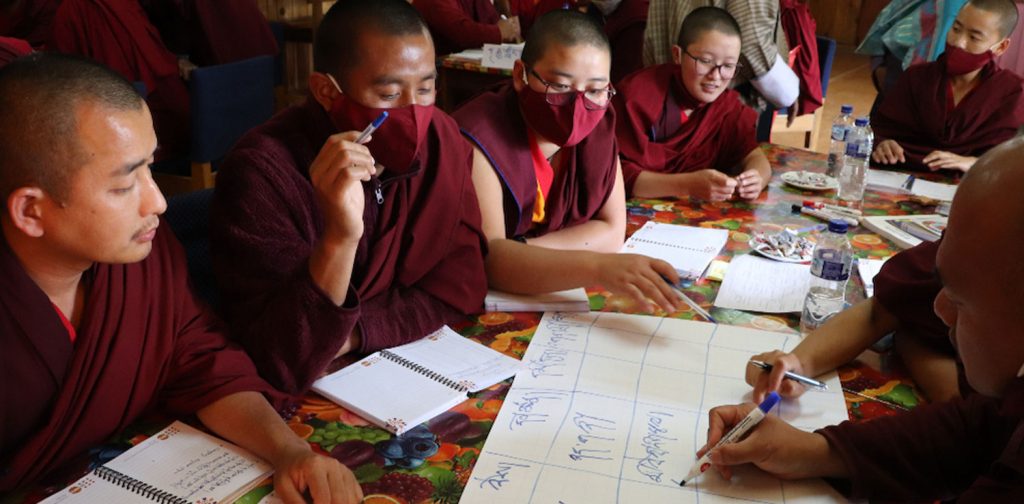Sex Education for the Monks and Nuns of Bhutan

The monks in Trashi Yangtse District, Bhutan, are teaching young people sexual and reproductive health and rights and gender-based violence. © UNFPA Bhutan/Tshering Penjor
Knowledge is a necessity, and that includes knowledge of sexual and reproductive health. Not too long ago, talking openly about sexuality and reproduction was considered taboo. There was an even firmer separation between sexuality and religious teachings. Today, Bhutan is removing that stigma and providing comprehensive sex education for all, especially religious leaders.
Bhutan’s fight for comprehensive sexuality education for all began long before. The woman who spearheaded this movement was none other than Her Majesty the Queen Mother, Gyalyum Sangay Choden Wangchuck. For over two decades, she has been determined to advocate and raise awareness on these issues, including HIV/AIDS prevention and family planning.
Her Majesty the Queen Mother, Gyalyum Sangay Choden Wangchuck, is a UNFPA Goodwill Ambassador and a 2020 United Nations Population Award laureate. In her work, she reaches out to everyone in society to spread comprehensive sexuality education, including religious groups.
United Nations Population Fund (UNFPA) is a U.N. agency founded in 1969 with a mission to improve global reproductive and maternal health. UNFPA’s efforts to engage religious leaders in Bhutan began in 2011 with the Bhutan Nuns Foundation. In 2014, UNFPA started to expand its movement to include male monks.
Nuns play an essential part in spreading sexual and reproductive health knowledge in the community. They have the community’s trust and respect. Nuns are crucial to relay the necessary knowledge on things such as a pap smear, menstrual hygiene, contraceptives, family planning, and gender-based violence to rural women.
Sex education for male monks has helped lessen the stigma that sexual and reproductive health and women’s issues are private matters and taboo. Today, the religious mask dances performed as part of tshechu (“day ten”) festivals include messages and knowledge on sexual and reproductive health and gender-based violence.
According to data by UNFPA, maternal mortality in Bhutan has dropped from 380 to 89 per 100,000 live births (1994 to 2017); contraceptive use rate has risen from 30.7% to 65.6% (2000 to 2018); and over 95% of births are now delivered by skilled birth attendants, risen from 23% (2000 to 2021).
UNFPA has imparted critical knowledge on sexual and reproductive health and rights issues and gender-based violence prevention to more than 1,500 nuns from 26 nunneries, as well as 350 heads of monastic institutions. Students across Bhutan now have access to counseling services provided by almost 50 monks trained by UNFPA.
Comprehensive sexuality education is a necessity and a right for everyone. It is a crucial part of our global goal to achieve good health and well-being. It is important for all members of society, including religious groups, to work together to raise awareness and provide access to facilitate sexual and reproductive health for all.
Editor: Marlis Afridah

Co-create positive impact for people and the planet.
Amidst today’s increasingly complex global challenges, equipping yourself, team, and communities with interdisciplinary and cross-sectoral insights on sustainability-related issues and sustainable development is no longer optional — it is a strategic necessity to stay ahead and stay relevant.

Nazalea Kusuma
Naz is the Manager of International Digital Publications at Green Network Asia. She is an experienced and passionate writer, editor, proofreader, translator, and creative designer with over a decade of portfolio. Her history of living in multiple areas across Southeast Asia and studying Urban and Regional Planning exposed her to diverse peoples and cultures, enriching her perspectives and sharpening her intersectionality mindset in her storytelling and advocacy on sustainability-related issues and sustainable development.


 Indian Gig Workers Push Back Against 10-Minute Delivery Service Strain
Indian Gig Workers Push Back Against 10-Minute Delivery Service Strain  Call for Governance: Grassroots Initiatives Look to Scale Efforts to Conserve Depleting Groundwater
Call for Governance: Grassroots Initiatives Look to Scale Efforts to Conserve Depleting Groundwater  Integrating Environment, Climate Change, and Sustainability Issues into Education Systems
Integrating Environment, Climate Change, and Sustainability Issues into Education Systems  Finally Enforced: Understanding the UN High Seas Treaty
Finally Enforced: Understanding the UN High Seas Treaty  Risks and Opportunities of Submarine Communication Cables for Sustainable Development
Risks and Opportunities of Submarine Communication Cables for Sustainable Development  Rising Attacks and Violence Against Land and Environmental Defenders
Rising Attacks and Violence Against Land and Environmental Defenders